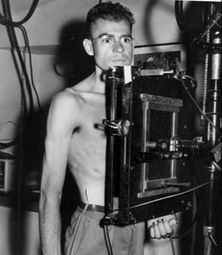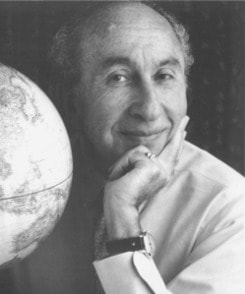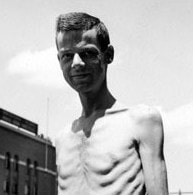"Medical crimes have been perpetuated against human beings."
- "Medical Code is Sought" The New York Times, 1949
|
Once WWII was over, the world learned of Nazi experimentation and torture of Jewish people in concentration camps. For the trial of Nazi doctors, international ethical standards for scientific experimentation were necessary. The United Nations adopted Nuremberg Code in 1946, stating “human subject[s] should be at liberty to bring the experiment to an end if he has reached the physical or mental state where continuation of the experiment seems to him to be impossible.”
Time/Life Images, 1945.
"[Keys and his colleagues] found it pretty tough to listen to people who said they'd had it, or couldn't take it anymore, or didn't want to go on... so it's probably ethically suspect in terms of the release of the subjects." |
Nazi Experimentation, United States Holocaust Memorial Museum, 1944.
"Did [Keys and his colleagues] have to go as far? Did they have to use as many? Did they not use enough? Those dimensions have to be looked at because you always have to justify what you're putting them through in terms of max yield of information" The MNSE did not satisfy this requirement, as the mental and physical effects starvation made it impossible for human subjects to challenge the ethically questionable methods of experimentation.
|
Through the Participants' Eyes
|
Conflicting Ethics[The Nuremberg Trials are] furthering of the cause of future peace through the actual enforcement of rules of international law by imposing effective sanctions against those who wage aggressive war.” What is the basis for asserting so broad and substantive international law? Where is the treaty, the custom, the academic learning on which it is based? |
"Why do people who were drafted go to fight wars, without escaping? Because there's a duty. It's the same kind of a thing, just a different battlefield. And from our point of view at the time, it was a battlefield consistent with what our conscience would tell us. But it was a battlefield. And battlefields are not supposed to be easy."
- Max Kampleman, Minnesota Starvation Experiment participant, 1993
Ella Hoch Robinson
A Duty to Starve: The Minnesota Starvation Experiment
First Place National History Day 2018
Junior Individual Website
Word Count: 1200
Media Time: 3:57
Process Paper: 499
A Duty to Starve: The Minnesota Starvation Experiment
First Place National History Day 2018
Junior Individual Website
Word Count: 1200
Media Time: 3:57
Process Paper: 499
Proudly powered by Weebly


